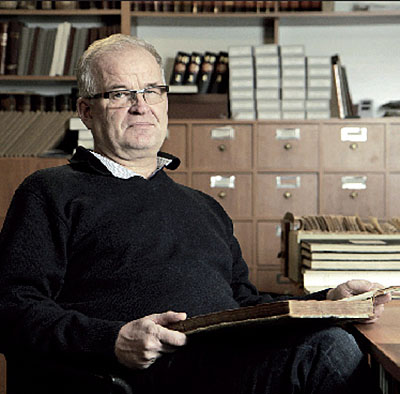
Photo by Andrzej Romański
The most important thing is that we are present and visible in places that are frequented by both politicians and journalists.
In conversation with Krzysztof Mikulski, President of the Polish Historical Society
Foreign media perpetuate the term “Polish camps” almost every other day. What can we do to fight historical lies more effectively?
Our core duty is to react strongly to every single use of the term. In most instances the phrase “Polish camps” is used due to basic historical ignorance. Each time we point out these mistakes we offer educational value, and that activity should always be on the Polish historical policy agenda. However, you need to bear in mind that journalism is changing quickly these days, and new people are constantly entering the profession. We need to focus more on prevention to really reduce the phenomenon and eliminate the use of the term “Polish camps” in the news.
What kind of prevention?
The most important thing is that we are present and visible in places that are frequented by both politicians and journalists. By “places”, I also mean the most popular Internet sites in each country. If you are planning to say or write something about World War II, you are bound to use an encyclopaedia site like Wikipedia. We need to watch these websites on a daily basis and make sure that they provide true information and explain a variety of problems, for example why the term “Polish camps” has nothing to do with historical truth. We need to help people who know little about history to get on the right track and use trusted sources.
So we haven’t paid enough attention to the problem before?
Some people wonder whether we did everything we could to reach our target audience with suitable information. Please bear in mind that it is not a one-off activity. You have to be on alert all the time and check if there are any distortions on the Internet, add interesting information, translate both academic papers and scientific papers for the general public into other languages and publish them on the sites that guarantee good readership.
Is it enough to eliminate the term “Polish camps”, which has been perpetuated for years now?
I am sure that consistent action will sooner or later bring really positive results. If we want to fight mendacious information on “Polish camps”, we should do something more than just educate journalists. We should also harness a variety of events and anniversaries to promote our values. For example, the Third Congress of Polish History will be held in Kraków in 2017. This provides a great opportunity to reach out to foreign researchers, who serve as the ambassadors of our history, and make them more sensitive to the problem of “Polish camps”.
What do you think about an idea to create a big-budget feature film to promote Polish history?
Any activity that fosters historical awareness is welcome. This, however, is not only about making a good film, but also about attracting large foreign distributors to make sure that it can reach wide international audiences.



